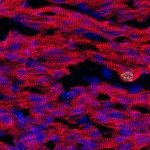Link to Pubmed [PMID] – 38438357
Link to DOI – 10.1038/s41467-024-45805-y
Nat Commun 2024 Mar; 15(1): 1982
De novo synthesis of the pyrimidine, cytidine triphosphate (CTP), is crucial for DNA/RNA metabolism and depends on the CTP synthetases, CTPS1 and -2. Partial CTPS1 deficiency in humans has previously been shown to lead to immunodeficiency, with impaired expansion of T and B cells. Here, we examine the effects of conditional and inducible inactivation of Ctps1 and/or Ctps2 on mouse embryonic development and immunity. We report that deletion of Ctps1, but not Ctps2, is embryonic-lethal. Tissue and cells with high proliferation and renewal rates, such as intestinal epithelium, erythroid and thymic lineages, activated B and T lymphocytes, and memory T cells strongly rely on CTPS1 for their maintenance and growth. However, both CTPS1 and CTPS2 are required for T cell proliferation following TCR stimulation. Deletion of Ctps1 in T cells or treatment with a CTPS1 inhibitor rescued Foxp3-deficient mice from fatal systemic autoimmunity and reduced the severity of experimental autoimmune encephalomyelitis. These findings support that CTPS1 may represent a target for immune suppression.


